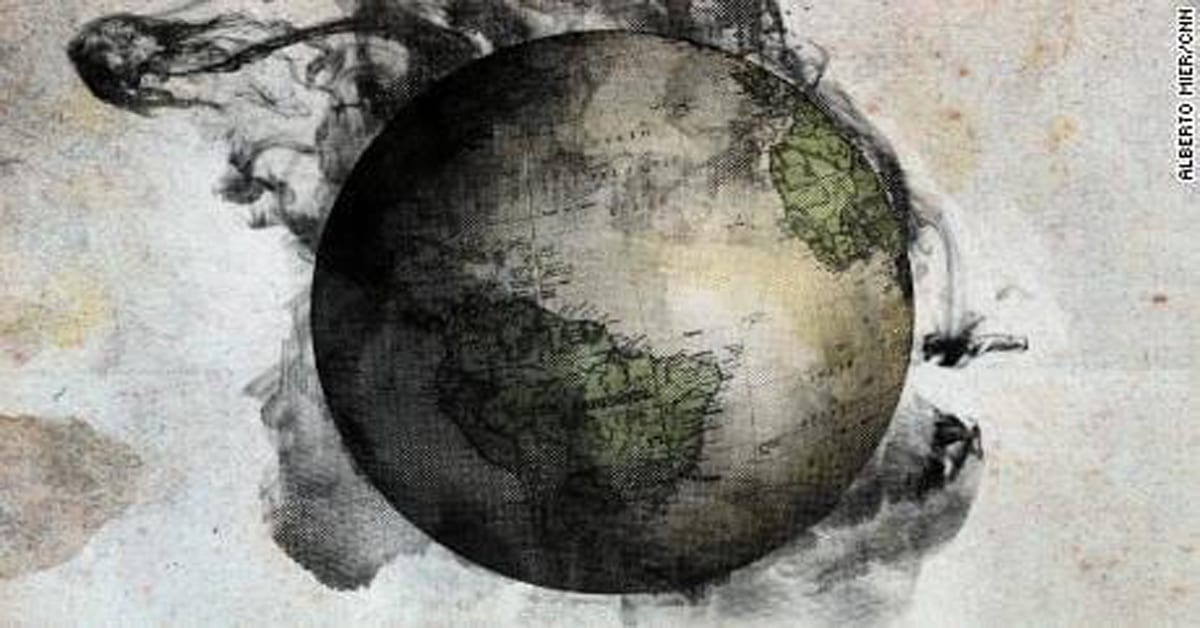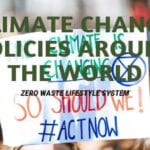
More than any time in human history, climate change is significant in 2019. It is this year that Earth and its climate has suffered many calamities. This includes forest fires, flooding, sinking, melting icecaps and more. But 2019 also tells the story of worldwide climate change activism – which shows the youth fighting for their future.
Climate Change in 2019 Becomes an Urgent Issue
The principal basis of human livelihoods and well-being, including the supply of water, food, as well as the biodiversity are provided by our land. Land plays a role in the climate system. The biodiversity and ecosystem of the land is very vulnerable on climate change. Everything from animal life to resource distribution suffer as Earth’s climate becomes more volatile.
For example, Brazil’s deforestation, in addition to global warming, warms the soil and enhances convection which raises the relative temperature difference between land and ocean, enhancing ocean moisture advection and thus more rainfall inland. Deforestation causes global climate change by releasing carbon trapped in the soil and trees and reducing the ability of the earth to reabsorb it. Changes in climate has a big impact in our world.
Climate Change Disasters and Issues in 2019

The year 2019 is coming to an end, Let’s recall the climate change issues happened during the whole year.
First, the Arctic region’s temperature remained high throughout this year.Its average temperatures were the second highest since 1900 for the year ending in September. High temperature concerns over sea level rise because of low formation of summer sea ice.
Second, a coalition of highly influential scientists and activists called in April 2019 to ‘defend, preserve and rebuild forests, peatlands, mangroves, salt marshes, natural seabeds and other vital habitats ‘ in order to allow nature to extract and store carbon dioxide from the atmosphere.
The dark clouds of smoke smothered cities in Brazil as parts of the Amazon burned at a rate not seen in years, and the world responded with outrage. Amazon’s forest is the largest forest in the world. It helps to slow down the pace of global warming. After this incident happened, there were a dozen of protests of Brazilian’s President Jair Bolsonaro’s environmental policies.
While fires in the Brazilian Amazon have eased, in another vulnerable area to the south, the Cerrado savanna, it has been a different story. According to WWF, the Cerrado Savannah forest is one of the most endangered ecosystems in our planet. So far in October, there have been almost 1,800 fires in the Cerrado, but the worst is likely to have passed.
A study found out that Greenland is losing ice faster than it did in the 1990’s. The ice of Greenland contributes directly to the rise of the sea level as it melts because it rests on a large land mass, unlike the floating sea ice that makes up much of the rest of the Arctic ice cap.
Climate change has adversely impacted food security and terrestrial ecosystems in many regions in the world. Climate change has already impacted food security due to warming, shifting patterns of precipitation and increased frequency of some extreme events. Many crop yields (e.g. corn and wheat) have decreased in many lower latitude regions, while some crop yields (e.g. maize, wheat and sugar beets) have risen in many higher latitude regions over recent decades (high confidence).
There is strong evidence that agricultural pests and diseases have already responded to climate change leading to both increases and decreases (high confidence) in infestations. Climate change affects food security in drylands, especially in Africa and high mountain regions of Asia and South America, based on indigenous and local knowledge. To combat climate change, we must sustain land development and adaptation practices.
Here are some news/articles that happened over the year:
- January 2019: According to National Centers for Environmental Information, the global average temperature on land and ocean surfaces was tied to 2007 as the third highest in the NOAA global temperature record, dating back to 1880, for the month of January.
- February 2019: “Earth could warm by 14°C as growing emissions destroy crucial clouds” – The disappearance of these bright white clouds would have a dramatic warming effect, Schneider estimates adding 8 ° C to the global temperature.
- March 2019: A worldwide movement: Students around the world are pressing for action on climate change. The changing climate on Earth, as demonstrated by rising wildfires and droughts, rising seas, and more extreme weather. Governments, as students see it, have not done enough to cut greenhouse gas emissions, such as carbon dioxide, curb global warming, or devise ways to adapt to climate change impacts.
- April 2019: “Nearly 40% of plant species are very rare and are vulnerable to climate change” According to new research from the University of Arizona, approximately 40 percent of global land plant species are classified as very rare, and these plants are most at risk of extinction as the climate continues to change.
- May 2019:The UN body for monitoring climate change is the Intergovernmental Panel on Climate Change (IPCC). In May 2019, the Methodology Report 2019 Refinement to the National Greenhouse Gas Inventory Guidelines for 2006 IPCC was issued.
- June 2019: “A Deadly Heat Wave After the Hottest June On Record: How the Climate Crisis Is Creating ‘a New Normal’” – Scientists say that July is expected to be the hottest recorded in July after the hottest recorded in June. It is expected that these forms of heatwaves will become more frequent worldwide as global warming progresses, scientists say.
- July 2019:In Germany, the Netherlands, the UK, Belgium and France, a heat wave battered Europe, smashing temperature records. Temperatures in Paris hit 108.7 degrees F (42.6 degrees C). The project World Weather Attribution found that heat waves had “very little risk” of happening without human-caused pollution in France and the Netherlands.
- August 2019: “Persistent Summers, Bumpier Plane Rides and More Heat Deaths” Scientists have found that climate change is rising vertical shear, resulting in flight turbulence.
- September 2019:“Satellite Data Record Shows Climate Change’s Impact on Fires” – NASA satellites have been observing from space for two decades, whether starting spontaneously or by humans, fires around the world and subsequent smoke pollution and burnt areas.
- October 2019: “ Urgency of climate change may be understated in intergovernmental panel report, expert says” It noted potential hazards from the rise in sea level, water shortages in glacier-fed rivers, diminishing and changing fish stocks, and increased storm frequency and severity, among many other hazards.
- November 2019: “Why science failed to stop climate change” In 1961, Alvin Weinberg, the founder of the Oak Ridge National Laboratory, named carbon dioxide one of the world’s “big problems” “on whose solution the entire human race’s future depends.” Almost 30 years later, and in 1992, President George H.W. Bush signed the United Nations. Climate Change Framework Convention (UNFCCC), which promises “concrete action to protect the world.”
- December 2019: “Can PH, rest of world shift to 100% renewable energy?” Delina clarified that the Philippine government has concentrated too much on large infrastructure while smaller energy systems are also required to serve remote areas such as typhoon-prone islands.
Actions Against Climate Change in 2019

The United Nation climate action focuses on world leaders, government, the private sector and civil society on the importance of global crisis action and rising climate action. To keep every step of the way on the frontline of climate action. According to UN Secretary-General António Guterres, “We need more concrete plans, more ambition from more countries and more businesses. We need all financial institutions, public and private, to choose, once and for all, the green economy.”
The importance for greater leadership action and their resolve to hold leaders to account was driven home by youth leaders like Greta Thunberg. She is is a Swedish environmental activist with international recognition for his campaigning on climate change. Climate change “is the biggest crisis humanity has ever faced,” she told UN secretary general António Guterres before that conference started. “First we have to realize this and then as fast as possible do something to stop the emissions and try to save what we can save.”
Student protests have taken place somewhere in the world every week. In 2019, more than one million students were involved in at least two co-ordinated multi-city protests.
In the early 1950s, global climate change was first discussed in U.S. policy. Regional governments, states, and cities across the country are making substantial reductions in emissions and gaining important political experience as they take action on climate change. Such activities include increasing the production of renewable energy, selling sequestration credits for agricultural coal, and promoting better use of energy.
Arizona Governor Janet Napolitano signed an executive order on September 8, 2006, calling on the state to develop programs to reduce greenhouse gas emissions by 2020 to 2000 and by 2040 to 50% below 2000.
Conclusion
Individuals need to exercise their rights both as citizens and as consumers. Even though we’re not as big as them, or influential like them, our voice matters and we can save our planet too. By doing the 3 “R” – Reduce, Reuse, Recycle, we can lessen the pollution in our environment.
To help us create a less wasteful environment, we need to be resourceful. In that way, we can save our world. Limit the use and substitution of fossil fuels such as oil, coal and natural gas with alternative and cleaner energy sources, thus increasing energy efficiency.
Plant more tress and conserve our natural resources. Be a responsible citizen of our country.





Great post! We all really do need to take ownership of our world and do everything possible to reduce our footprint. Personally we recycle a lot of things and also compost our food waste to use in our garden. Small things, but they add up!
Nice charts. It really shows how many different facets of the world are affected by climate change and how much work needs to be done to try to slow down and eventually reverse the process, if possible in such a short amount of time.
Climate change is a real concern for me. The problem is that the world we’ve created is not sustainable by nature. We live in a throw-away culture and changing that needs to be a collective effort.
A good post. But I think the main source of global warming is industries. If the industries could safe dispose their waste. It will be a clean environment.
Very insightful! Our voice definitely matters. I am following the three R,s as much as I can. Planting trees is a tradition in our family. Climate change and global warming worry me! I hope we together can bring the changes and keep mother nature green. Thank You!
Wow. Climate change is becoming more and more serious. I Recycle a lot of items and I feel proud for doing it.
We shouldn’t except the government and big companies to handle it for us. Society should do it in every day life. One way woman particular could help is by using reusable feminine hygiene products or new parents to use reusable diapers. These products are super bad for the environment and millions/billions are thrown every day!
Climate change is a very big problem for this modern world. We are working on use and throw policy which is bad for nature. We should use replace the ‘use and throw’ things with permanent things, which has a long life.
Great article with citations to back everything up. I wish this issue hadn’t become a political issue, it would have been much better if it was kept out of partisan politics.
Yes, climate change is real but this issue is being sidelined in national and global policies due to economic and social pressures.
Thank you for bringing light to this serious issue!
Excellent article. I will be dealing with many of these issues as well..
Great post, I’ve learn some things and I believe we all have to think on some things and how can help even if small steps!
It’s really interesting info, I’ve learn some things and I believe we all have to think on some things and how can help even if small steps!
Howdy! I’m at work surfing around your blog from my new iphone 3gs! Just wanted to say I love reading your blog and look forward to all your posts! Carry on the excellent work!
Awesome! Its really awesome piece of writing, I have got much clear idea about
this topic.
“Great article and right to the point.
It’s in point of fact a nice and helpful piece of information. I’m happy that you just shared this helpful info with us.
Please keep us informed like this. Thank you for sharing.